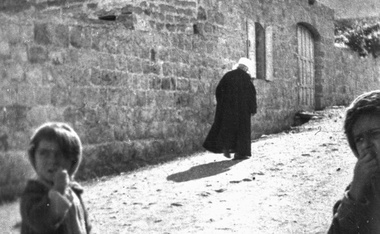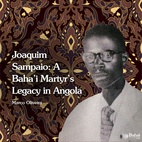The views expressed in our content reflect individual perspectives and do not represent the authoritative views of the Baha'i Faith.
For Baha’is, understanding the life of Abdu’l-Baha, Baha’u’llah’s son and successor, means learning about what being a Baha’i truly represents — because Abdu’l-Baha lived an exemplary Baha’i life.
Baha’u’llah — the prophet and founder of the Baha’i Faith — conferred upon Abdu’l-Baha a unique and sublime station, unprecedented in all religious history: exemplar. That unparalleled role characterizes Abdu’l-Baha’s life as a model for all Baha’is.
In his conduct, his actions, his nobility, his priorities, and his principles, Abdu’l-Baha demonstrated what being a Baha’i really means. Baha’is follow Baha’u’llah and try to take after Abdu’l-Baha.
RELATED: How Did the Baha’i Faith Spread Around the World?
In fact, in the preface to Baha’u’llah’s Most Holy Book, the Universal House of Justice explained:
… the unique role which Baha’u’llah’s Writings — indeed the text of the [Most Holy Book] itself — confer on His eldest son, Abdu’l-Baha. This unique figure is at once the Exemplar of the pattern of life taught by His Father, the divinely inspired authoritative Interpreter of His Teachings and the Center and Pivot of the Covenant which the Author of the Baha’i Revelation made with all who recognize Him.
Recognizing this singular station sheds light on why Baha’is and others carefully study and contemplate Abdu’l-Baha’s life and endeavor to pattern their own lives in similar ways.
That makes the translation and publication of a new book about Abdu’l-Baha a major event.
Recently, the British Baha’i publisher George Ronald issued Adib Masumian’s detailed new translation of the second volume of Mahmud’s Diary, now titled Abdu’l-Baha in Europe 1912-1913. The book chronicles — from an eyewitness perspective provided by one of the people who traveled with him — Abdu’l-Baha’s unprecedented journey through Europe more than a century ago and provides new insights for the English-speaking world about the things he said and did. I asked Adib several questions about the new book:
David Langness: While working on this book, Adib, what did you learn about Abdu’l-Baha that you may not have realized previously? Did the translation and the accompanying research give you a different sense of certain aspects of his personality, his approach to explaining the Baha’i Faith to others, or his viewpoints?
Adib Masumian: In this book, there are instances where Abdu’l-Baha recounts episodes from his own life, going all the way back to his youth and even childhood. For example, he mentions that the first time he ever addressed a public gathering was as an adolescent in Baghdad — when he was about fifteen years old, according to one source — and he was apparently so nervous on that occasion that he was sweating as he began to speak.
He also talks about how he disliked small, closed spaces ever since he was a child, and that he wanted to learn Arabic so badly as a boy that it actually made Him cry, but that — without formally studying it — he eventually gained a mastery of it that, in his words, surpassed the proficiency of the most eloquent of Arabs, as only the Mystery of God [one of Abdu’l-Baha’s titles] could do.
These unique anecdotes are valuable because they shed light on corners of Abdu’l-Baha’s life that were not previously known to most people. Consequently, we get a more complete sense of who this superhuman person was, and can appreciate him to an even greater degree than we could before.
This book also has much to teach us about Abdu’l-Baha’s approach in explaining the Baha’i Faith to others. Whether in more intimate conversations or in the course of his public talks, my impression is that Abdu’l-Baha tended to “meet people where they were” by speaking in their parlance, or drawing on concepts and imagery that would have resonated with them.
One day, while in England, he expressed his hope to a railroad worker that he might “straighten the pathway to heaven,” and counseled him to become “a heavenly lineman.” In Germany, he told a music teacher that “music is one of the signs of God,” and that he hoped this teacher would use heavenly music “to confer abiding joy and ecstasy on the minds and spirits.” When he would talk to the Esperantists, he extolled the virtues of global communication, emphasizing the primary Baha’i principle of a universal auxiliary language. When he talked with suffragists, he discussed the Baha’i principle of gender equality and women’s rights. The one time he is known to have spoken at a mosque in Europe, he concluded his talk with an Arabic prayer whose wording and structure were unmistakably similar to that of the first chapter of the Qur’an. The list goes on and on. He had a matchless ability to make the Baha’i message relevant to whomever he was talking with.
Of course, those same talks also demonstrate the spontaneous eloquence of Abdu’l-Baha. He did not have the modern benefit of a teleprompter, and I don’t get the impression that he rehearsed his discourses — he may have spoken about the same things to different audiences, but none of it was scripted. His words were extemporaneous, and that’s even more impressive when you consider how often he quoted from the scriptures of past religions, or poems and proverbs, to make his illuminating points. His command of facts, of human history, of the teachings of all the world’s religions, and of the great spiritual truths amazed his audiences, and amazed me. He had no need for the crutches typically relied on by today’s orators, when he was sustained by an incomparable measure of Baha’u’llah’s confirmations. To see Abdu’l-Baha speak with such facile ability must have been a truly thrilling experience.
David: Abdu’l-Baha had different reactions to the European cities he visited and stayed in. He seemed to enjoy London, for example, more than he did Paris. Why do you think he had those reactions?
Adib: Yes, that’s right, and I think it boils down to the inclinations and interests of the people in these different countries. If they were devoted to spiritual (or at least noble) endeavors, Abdu’l-Baha regarded them favorably, but if they were immersed in baser pursuits, he did not look on them the same way.
Abdu’l-Baha found quite a receptive population in the United Kingdom. People filled large venues, including churches, to hear him speak, and these events received ample press coverage that has been documented in books like Amin Egea’s Apostle of Peace.
By contrast, the capital of France seems to have been suffused with hedonism and materialism during that period — hardly an environment that would have fostered spiritual sensibilities. This volume has many instances where Abdu’l-Baha severely criticized the Parisian way of life and expressed how heavy it made his heart to be in Paris. This is probably why he seldom spoke at large gatherings while in France the way he did in the other countries covered in this chronicle — because he likely would not have garnered much of an audience. Instead, Abdu’l-Baha spent most of his time there talking with the Baha’is and sometimes other visitors at their homes or his own residence, often exhorting them to teach the Baha’i principles and instructing them on how to go about doing so.
David: Abdu’l-Baha had close connections with Baha’is from everywhere, but during his European sojourn his affection and regard for the German Baha’is seemed especially warm. Can you explain why?
Adib: It certainly does seem that way. He said the following to a larger group while in Stuttgart, “It is clear that this place is both receptive and worthy. God willing, the Cause of God will make great strides here and be spread far and wide.”
Abdu’l-Baha was pleased with those who were spiritually-minded, and I don’t think any group of people mentioned in this chronicle exemplified that quality at the time more than the German Baha’is. In them, Abdu’l-Baha found an especially stalwart and devout group of believers, who endeavored to instill those same virtues in their children.
Abdu’l-Baha in Europe 1912-1913 contains a very memorable account of a children’s festival held at a school in Esslingen, in which they had formed a neatly-ordered line extending from the entrance of the building all the way to its main room so they could greet Abdu’l-Baha by exclaiming “Allah-u-Abha!” [a Baha’i greeting that means “God is most glorious!”] This delighted him; he handed them sweets and implored blessings for them.
RELATED: What Happens to Love When We Die? The Passing of Abdu’l-Baha
That is just one example, but it’s emblematic of a beautiful reciprocal relationship: the German Baha’is were admirably earnest and outstandingly devoted, and in return, Abdu’l-Baha showered them with his love. Whenever he was about to leave a country, he typically made parting remarks to the Baha’is of that place, and the most extensive selection of those final words of loving counsel included in this chronicle are His farewell addresses to the Baha’is of Germany:
Today I will bid you farewell, but farewells are of two kinds. One is a farewell in which people say their goodbyes and then forget one another with the passage of time. This is a farewell that suits the inhabitants of this nether world. But a farewell that carries no forgetfulness is the one that befits the denizens of the Kingdom and the loved ones of Baha’u’llah — a farewell in which people only draw closer to one’s heart as they go farther away from one’s sight, and in which a bond so strong exists between them that it shall never be severed.
Adib Masumian’s new translation of the second volume of Mahmud’s Diary, titled Abdu’l-Baha in Europe 1912-1913, is now available from George Ronald: www.grbooks.com


















Comments
Sign in or create an account
Continue with Googleor